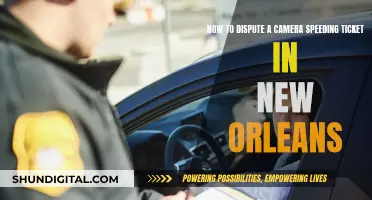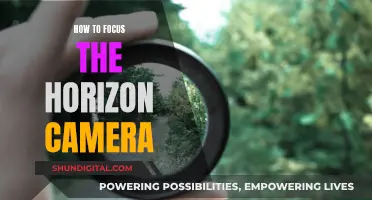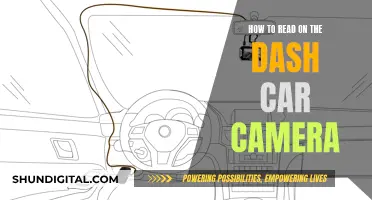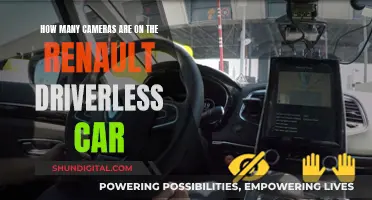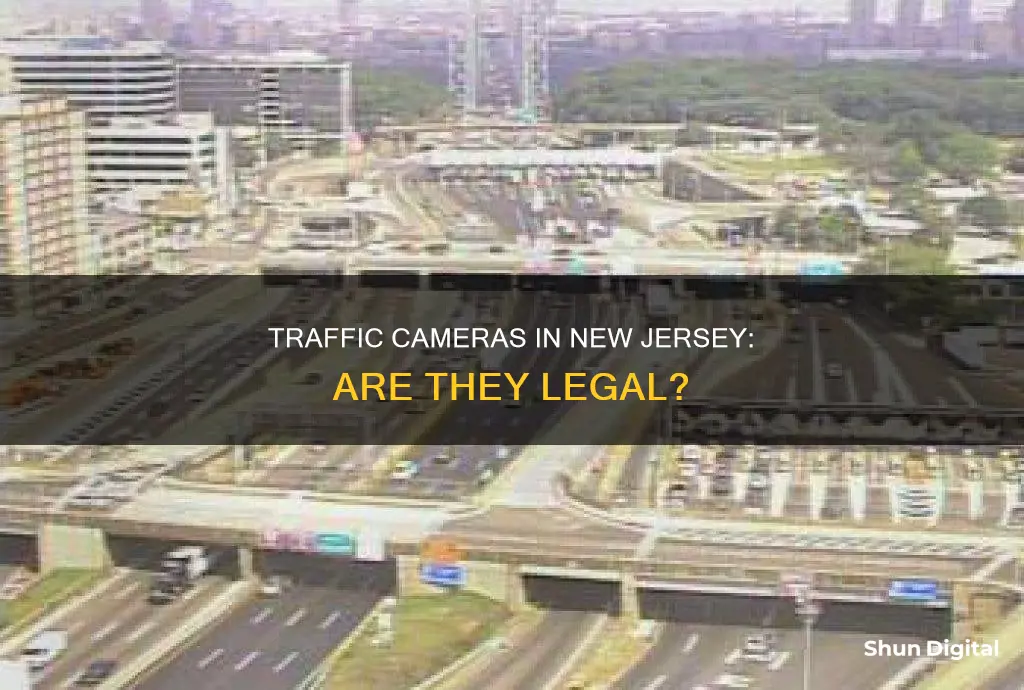
Red light cameras are a controversial topic in New Jersey. While some argue that they promote safety and reduce reckless driving, others believe they infringe on drivers' rights and are solely about generating revenue. New Jersey ended its red light camera pilot program in 2014 due to technical issues and concerns about their effectiveness. However, as neighbouring states use similar systems, New Jersey lawmakers are working to prevent out-of-state camera-based citations from being issued to New Jersey drivers.
| Characteristics | Values |
|---|---|
| Red light cameras | Ended in 2014 due to technical glitches |
| Red light camera fines | Up to $250 depending on the number of times the offense is repeated |
| Traffic cameras | Controversial; some believe they promote safety and reduce reckless driving, while others believe they infringe on driver's rights |
| Out-of-state red light camera citations | Prohibited by the Senate in 2022 |
What You'll Learn

Red light cameras in New Jersey are no longer in use
The pilot program resulted in hundreds of thousands of violations and created a new revenue stream for dozens of municipalities. However, there were also multiple problems with the system's accuracy, and technical glitches occurred too often. For example, in one instance, almost 17,000 tickets were voided due to a technical glitch.
The fight to end the program was led by then-State Assemblyman Declan O'Scanlon, who, along with State Senator Mike Doherty, uncovered the issues with the system. As a result of their efforts, New Jersey's Red Light Running (RLR) Automated Enforcement Pilot Program ended in 2014, and the state's red-light cameras were shut down.
Despite the program's end, it is still possible for drivers to receive red-light camera tickets from other states when travelling through them. Lawmakers in New Jersey are working to prevent this from happening by introducing legislation that would prohibit the state's Motor Vehicle Commission from sharing personal information for the purpose of issuing tickets.
Using Your Device: Viewing Yourself on Your Computer Camera
You may want to see also

The use of red light cameras is controversial
Red light cameras are integrated with traffic signals and sensors to detect vehicles that proceed through intersections during a red light. They are typically installed at intersections and capture evidence of traffic violations such as speeding and reckless driving. The cameras record visuals of vehicles that skip signals, along with the license plate number as proof. In New Jersey, most cameras give the driver a grace period of 15 seconds to stop at the signal before capturing their images.
Proponents of red light cameras argue that they enhance road safety by deterring reckless behavior and reducing accidents caused by red light running. They believe that the cameras can effectively penalize those who violate traffic rules, making roads safer for everyone.
However, critics of red light cameras have several concerns. One of the main arguments against them is that they prioritise revenue generation over public safety. Some even suggest that they may lead to increased rear-end collisions as drivers abruptly stop to avoid being photographed, potentially causing more accidents. Additionally, there is a debate about the fairness of penalising vehicle owners without proving they were the driver, especially when these citations can impact insurance rates and driving records.
The controversy surrounding red light cameras has led to legal challenges and varying laws across different states. In Missouri, for example, the Supreme Court has made tickets from these cameras "virtually unenforceable", arguing that they put the burden of proof on the driver, potentially raising constitutional issues. In New Jersey, the use of red light cameras was ended in 2014 due to technical glitches and the expiration of the state's automated traffic enforcement pilot program.
Surveillance Cameras: The Benefits of 15-900 Second Time Range
You may want to see also

Red light cameras can result in surprise traffic tickets
Red light cameras in New Jersey monitor traffic violations and impose penalties and tickets on vehicles that violate traffic rules. These cameras are usually placed near busy intersections to capture images and videos of vehicles that enter the intersection while the light is red.
While red light cameras are meant to improve road safety, they can also result in surprise traffic tickets for drivers. Here's how:
Surprise in the Mail
Red light cameras are often positioned near busy intersections with multiple cameras at different angles to capture images and videos of vehicles that run red lights. The cameras also capture the license plate and the driver's face. Weeks after the violation, the driver or vehicle owner receives a surprise in the mail—a traffic ticket. This surprise can be quite unpleasant, especially if the driver is not expecting it.
No Moving Violations or Criminal Charges
Red light camera violations are treated as administrative violations, similar to parking tickets. This means that drivers do not have the right to go to court and defend themselves against the accusation. Instead, they must pay the fine or face consequences such as a blemished driving record and increased insurance rates.
Automated Enforcement
Red light cameras are automated systems that work in sync with the traffic signal and pavement sensors. When a vehicle is estimated to be going too fast to stop at a red light, the camera is triggered, capturing still images and videos of the driver and vehicle. This automated process can result in a surprise ticket, as drivers may not realize they have been captured on camera.
Grace Periods
Some states have grace periods for new camera installations, during which no tickets are issued, but warning notices are sent to drivers. However, once the grace period ends, drivers may be surprised by the sudden enforcement of red light camera tickets.
Technical Glitches
Red light camera programs in New Jersey have faced technical glitches, resulting in thousands of void tickets. These glitches can cause uncertainty for drivers, who may be unsure if they will receive a ticket or not. This uncertainty can lead to surprise traffic tickets when the glitches are resolved.
While red light cameras are intended to improve road safety, their implementation can result in unexpected consequences for drivers, including surprise traffic tickets. It is important for drivers to be aware of the presence of these cameras and the potential for receiving tickets to avoid unpleasant surprises.
Spotting Fake Surveillance Cameras: What to Look For
You may want to see also

Red light cameras can improve road safety
Red light cameras are devices that monitor and capture evidence of traffic violations, such as speeding and reckless driving, at intersections. These cameras are currently a topic of debate in New Jersey, with some questioning their legality and effectiveness in improving road safety. While there have been changes in the laws regarding these cameras, the benefits of red light cameras in enhancing road safety are worth considering. Here are some reasons why red light cameras can improve road safety:
Deterrent for Red Light Running
Red light cameras act as a deterrent for drivers who might be tempted to run a red light. Enforcement is crucial in ensuring compliance with traffic laws, and while police presence at every intersection is impractical, red light cameras can fill this gap. Studies have shown that red light cameras reduce the number of vehicles running red lights. For example, a study in Virginia observed a 67% decrease in red light running after the implementation of cameras.
Reduction in Fatal and Injury Crashes
The presence of red light cameras has been linked to a decrease in fatal and injury crashes at signalized intersections. An IIHS study found a 21% reduction in fatal red light running crash rates and a 14% reduction in all types of fatal crashes at intersections with red light cameras. This is particularly important as red light running crashes often result in severe consequences, with half of the fatalities in 2022 being pedestrians, bicyclists, or occupants of other vehicles struck by red light runners.
Improved Traffic Flow and Safety
Red light cameras can lead to improved traffic flow and safety by discouraging abrupt braking and reducing "non-angle" collisions. While critics argue that red light cameras may increase the number of rear-end accidents, studies suggest that these tend to be less severe than "T-bone" or angle accidents, resulting in a net positive effect on overall road safety. Additionally, proper signal timing, such as adequate yellow light duration, can further enhance safety and reduce the incidence of red light running.
Public Support and Acceptance
Red light camera programs have generally received strong public support in various cities. Surveys conducted in 2011 and 2012 in cities with longstanding red light camera programs found that two-thirds to 87% of residents supported their use. When designed with the primary goal of improving safety rather than generating revenue, these programs are more likely to be successful in modifying driver behavior and gaining community acceptance.
In conclusion, while there may be differing opinions on the effectiveness of red light cameras in New Jersey, the evidence suggests that they can play a crucial role in improving road safety. By deterring red light running, reducing fatal and injury crashes, and improving overall traffic flow, red light cameras have the potential to make a positive impact on driver behavior and enhance safety for all road users.
Harris County: Camera Tickets and Registration Blocks
You may want to see also

Red light cameras can infringe on drivers' privacy
Red light cameras in New Jersey are no longer valid following the end of the state's automated traffic enforcement pilot program in 2014. However, this does not mean that the debate surrounding their use has ended. One of the primary concerns regarding red light cameras is their potential infringement on drivers' privacy.
While red light cameras are designed to improve traffic safety and reduce accidents by capturing images of vehicles that run red lights, opponents argue that they violate constitutional rights, including the right to privacy and the right to confront one's accuser. In terms of privacy, critics claim that these cameras can capture images of drivers and their vehicles without their consent, which invades their reasonable expectation of privacy while in their cars.
Additionally, red light cameras can record license plate numbers, which can be used to identify and issue tickets to drivers. This raises concerns about the potential misuse of personal information and the burden of proof being shifted onto the accused rather than the state. While proponents of red light cameras argue that there is no expectation of privacy on public roads, opponents counter that individuals have a reasonable expectation of privacy within their vehicles, even when driving on public roads.
The debate over red light cameras in New Jersey and other states underscores the delicate balance between public safety and individual privacy rights. While red light cameras may serve as a useful tool for enforcing traffic laws and reducing accidents, it is essential to consider the potential implications for drivers' privacy and due process rights.
To address these concerns, some states have implemented restrictions on the use of red light cameras, such as requiring proper signage notifying drivers of their presence or limiting their use to specific jurisdictions or circumstances. In New Jersey, the end of the automated traffic enforcement pilot program reflects the state's decision to prioritize drivers' privacy rights over the use of red light cameras for traffic enforcement.
Dispute Camera Tickets in Lake Forest Park, WA: What You Need to Know
You may want to see also
Frequently asked questions
Red light cameras are no longer in use in New Jersey after a pilot program ended in 2014. However, they are still used in surrounding states, and it is possible to receive a ticket from another state.
Red light cameras were introduced to monitor traffic violations and promote safety by reducing reckless driving. They captured images of vehicles that violated traffic rules and signals, and the owners of those vehicles would receive a ticket and a mail explaining the violation and location.
Red light cameras were discontinued due to technical glitches and concerns about infringing on drivers' rights and privacy. There were also issues with false accusations and tickets issued by mistake.
Yes, it is possible to receive a ticket from a red light camera in a state that uses them. However, there is legislation in place, such as Bill S-460, to protect New Jersey drivers from out-of-state camera-based citations and prohibit the disclosure of personal information.


